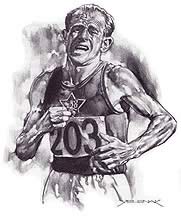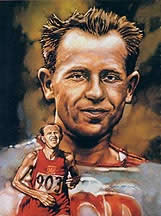|
|
|
|
|
|
|
|
|
|
|
|
|
|
|
|
|
|
|
|
|
|
Profiles One of the greatest runners of the 20th Century, Emil Zátopek achieved legendary status when he won the 5,000, the 10,000 and the marathon at the 1952 Olympic Games in Helsinki. "The Locomotive" or the "Bouncing Czech" as he came to be known, dominated long distance running from 1948 until 1954 when he won a remarkable 38 consecutive 10,000 meter races, including 11 in 1949 alone. He set 18 world records over various distances including every record from 5K to 30K, and won four Olympic gold medals and one silver. He was the first to run a 10K under 29 minutes and the first to run 20K in one hour. |
|||||||||||||||||||||||||||
|
The Beginning Emil Zátopek was born in Koprivnice, Czechoslovakia on September 19, 1922, the 6th child of a modest family. At age 16 he began working at the Bata shoe factory in Ziln. In 1940 Bata sponsored a 1,500m race, and he was persuaded to enter even though he had no training. Out of the field of 100 Emil finished second and he began to take a serious interest in the sport. A mere four years later, in 1944 Emil broke the Czech records for 2,000, 3,000 and 5,000 meters. He was selected for the Czech national team for the 1946 European Championships. He finished fifth in the 5K, breaking his own Czech record of 14:50.2, running 14:25.8. The Olympics The 5-foot-8, 145 pound athlete made his Olympic debut at the 1948 London Games. He was 26 years old with little international racing experience, yet he won the 10,000 and was second in the 5,000. Emil married Dana Ingrova, fellow Czech team member shortly after the Olympics. Dana and Emil shared the same birthday, September 19th, and they married on that day in 1948. Dana competed in the javelin and won gold in 1952 and silver in 1960. "The Nickel, the Dime, and the Big One" In 1952 at the Helsinki Olympics Emil achieved the impossible. Despite a doctor's warning that he shouldn't compete due to a gland infection two months before, he won the 5,000m, the 10,000m and the marathon, all in a span of eight days. He set a new Olympic record in all three events, and he had never run a marathon before! From their 1982 book Fast Tracks - The History of Distance Running authors Raymond Krise and Bill Squires describe the 1952 Olympic 5,000 Meter Final:
You can download a video of this race on our Vintage Media page. In 1955 Zatopek set the last two of his world records, for 15 miles and 25,000 meters. In 1956 he retired from competition after finishing sixth in the marathon at the Melbourne Olympics. He had a hernia operation six weeks before the games. Emil is credited with revolutionalizing running and training. He developed intense interval workouts that have become the standard today. In 1998 Emil was awarded the Order of the White Lion, a national honor presented to him by Czech President Vaclav Havel. During the last year of his life he had spent time in the hospital due to pneumonia and a broken hip. He died November 22, 2000 at age 78 after being admitted to Prague's Military Hospital following a stroke on October 30th. Thousands attended the funeral of the Czech Republic's greatest athlete.
Quotes by Emil Zatopek "Men,
today we die a little." - "Why
should I practice running slow? I already know how to run slow. - "When
a person trains once, nothing happens. When a person forces himself
to do a thing a hundred or a thousand times, then he certainly
has developed in more ways than physical. - "A runner must run with dreams in his heart, not money in his pocket." - "To boast
of a performance which I cannot beat is merely stupid vanity.
- "What
has passed is already finished with. - "We forget our bodies to the benefit of mechanical leisure. We act continuously with our brain, but we no longer use our bodies, our limbs. It is the Africans who possess this vitality, this muscular youth, this thirst for physical action which we are lacking. We have a magnificent motor at our disposal, but we no longer know how to use it." - "There is a great advantage in training under unfavorable conditions. It is better to train under bad conditions, for the difference is then a tremendous relief in a race." - "If
you want to win something, run 100 meters. - "You
can't climb up to the second floor without a ladder....When you
set your aim too high and don't fulfill it, then your enthusiasm
turns to bitterness. - "After
all those dark days of the war, the bombing, the killing, the
starvation, the revival of the Olympics was as if the sun had
come out....I went into the Olympic Village and suddenly there
were no more frontiers, no more barriers. Just the people meeting
together. It was wonderfully warm. Men and women who had just
lost five years of life were back again." - Emil Zatopek
describes his marathon win at the Helsinki Olympics, - "If you
come to think of it, you never see deer, dogs and - When asked
about his tortured expression during races, - "There
are three things worth living for: - "When I was young, I was too slow. I thought I must learn to run fast by practicing to run fast, so I ran 100 meters fast 20 times. Then I came back, slow,slow,slow. People said, 'Emil, you are crazy. You are training like a sprinter.'" - Emil Zatopek
on Interval Training, "Everyone said, 'Emil, you are a fool!'
- "It's at the borders of pain and suffering that the men are separated from the boys." - "He does
everything wrong but win." - "Great is the victory, but the friendship is all the greater." Other Profiles Johnny J. Kelley (The Younger) Marathon Artist
|
|||||||||||||||||||||||||||
RP
News | Articles | Trivia
| Profiles | Vintage
Video | Vintage Photos | Contact
Us | Site Map | Home
Cards | Posters
| Autographs | Books
| Pins | Prints
| Authentics | Sportscasters
| How to Order
©
Running Past LLC All Rights Reserved mail@runningpast.com


 Emil
Zátopek
Emil
Zátopek
